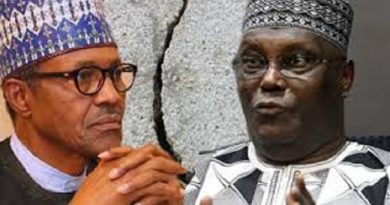Christian Leaders Kicks Against The Options On Companies And Allied Matters Act (CAMA)
The Christian Association of Nigeria (CAN) has commenced consultations with Christian leaders to determine the next action to take in order to get the federal government to reverse the provision of new Companies and Allied Matters Act (CAMA), 2020 signed into law by President Muhammadu Buhari recently, which empowers the federal government to appoint acting trustees for non-profit and non-governmental organisations in the event of a complaint of misconduct.
CAN said the provision and others in the new CAMA contain obnoxious provisions inimical to church administration.
However, the House of Representatives has called on non-governmental organisations (NGOs) and religious institutions opposed to the new CAMA to seek an amendment to the law.
The Special Assistant on Media and Communications to the CAN President, Pastor Adebayo Oladeji, told Newsmen yesterday that the association would not put all its eggs in one basket.
“We don’t want to put all our eggs in one basket; we just issued a statement rejecting the CAMA law. CAN has started consultations with Christian leaders on what our next move will be,” he said.
CAN, in a statement issued earlier yesterday, urged President Muhammadu Buhari to urgently return the law to the National Assembly for immediate amendment.
It said the law, which repealed the Companies and Allied Matters Act, 1990 (1), was assented to despite its rejection at the public hearing stage.
In the statement by Oladeji, CAN said if the federal government insisted on retaining the legislation, it would be seen as a declaration of war on Christianity and an agenda to destroy the church.
“The law, to say the least, is unacceptable, ungodly, reprehensible and an ill-wind that blows no one any good. It is a time bomb waiting to explode,” it added.
CAN said during the first term of the president, there was a public hearing conducted by the National Assembly on the “Non- Governmental Organisations Bill tagged ‘Bill for an Act to Provide for the Establishment of the Non-Governmental Organisations Regulatory Commission for the Supervision, Co-ordination And Monitoring of Non- Governmental Organisations,’ which was attended by CAN and many NGOs.
It said at the public hearing, the bill that sought to bring the religious organisations and NGOs under the control and influence of the government was rejected because it would kill the church.
It said: “We thought it was all over until we heard of the CAMA that was assented to by the president, making the rejected bill a law.
“The satanic section of the controversial and ungodly law is Section 839 (1) &(2), which empowers the commission (Corporate Affairs Commission) to suspend trustees of an association (in this case, the church) and appoint the interim managers to manage the affairs of the association for some given reasons.
“While we are not against the government fighting corruption wherever it may be found, yet we completely reject the idea of bringing the church, which is technically grouped among the NGOs, under control of the government. The church cannot be controlled by the government because of its spiritual responsibilities and obligations.
“This is why we are calling on the federal government to stop the implementation of the obnoxious and ungodly law until the religious institutions are exempted from it.
“Nigeria should not be compared with any other nation when it comes to the relationship between religious institutions and the government. In Nigeria, people’s religions are tied to their humanity and of course, their life.
“How can the government sack the trustees of a church which it contributed no dime to establish?
“How can a secular and political minister be the final authority on the affairs and management of another institution which is not political?”
CAN wonder how a non-Christian head of government ministry could be empowered to determine the running of the church as envisaged by the law.
It described such powers conferred on political appointees as an invitation to the trouble that the government does not have the power to manage.
It said the federal government did not have the technical expertise to run the church because of its spiritual nature.
It added: “If the government is bent on imposing a law on us which the entire church in Nigeria is against, then, they have declared war on Christianity and the agenda to destroy the church, which we have spoken against before now is coming to the open more clearly.
“If you cannot give us good amenities of life, we would not allow you to take away our liberty to worship our maker.
“What good thing again will you not take away from the people in the name of being in power? Are we not running a democracy which is a government of the people by the people and for the people?
Is this not gradually becoming a dictatorship or what was the essence of the public hearing you called us to when you had made up your mind not to consider the position of Christians at all which we presented during the public hearing?”
CAN called on well-meaning Nigerians to ask the federal government to suspend the law “because we do not need it in this nation.”
House Urges Aggrieved Nigerians to Seek Amendment
Reacting to CAN’s position, the House of Representatives has called on NGOs and religious bodies that have reservations about CAMA to push for the amendment to the law.
House spokesperson, Hon. Benjamin Kalu, told THISDAY that those who are not happy with some provisions of CAMA should approach the parliament and present their complaints through the proper channels, which will be considered by the legislature.
Kalu, however, berated the concerned parties for not airing their views during the public hearing stage of the bill.
He appealed to Nigerians to always heed to the lawmakers’ invitations to public hearings and as well as monitor any sector they are involved in.
He said: ”The Companies Allied Matters Act didn’t start with this 9th Assembly, it started with the 8th Assembly and it’s being on for about two years; there was enough time for recommendations to be made for the bill before it became an Act.
“There was public hearing; the process of lawmaking includes public hearing so that there can be an opportunity for interested parties to express themselves on what they don’t like about a particular bill to be considered before its passage and no law is a perfect law, neither are they cast on stones. There’s always a provision in the constitution for amendment of laws made by the parliament.
“Therefore, if the people the law is made for have any complaints, though they were supposed to be vigilant enough to raise it at the appropriate time, it’s better late than never.
”So, the opportunity that the constitution has allowed for those who are not happy with a piece of legislation is to come via way of amendment to the law. I am aware that lot professionals are happy with most provisions of the CAMA bill, but there are some who considered few provisions offensive and against their expectations, there’s still an allowance for an amendment to be made to it. All they have to do is to present it through the proper channels and that will be presented before the House and Senate and be considered.
”We have amended so many laws in Nigeria this will not be first or last. All the non-governmental agencies should have legal departments to know what to do and approach their various representatives to make a presentation before the House on the areas they are not happy with then go by way of amendment to the Act.
“So, this should not cause a problem in society at the moment. They should make use of the available opportunity created by the constitution to amend any legislation that they are not happy with. However, it’s important that people are vigilant, monitoring what is happening in a particular sector they are involved in.
”This is why I always urge Nigerians to accept our invitations when we call for a public hearing. The attitude of Nigerians to a public hearing has always been it’s their business and then when you are indolent and something happens you now run to equity and equity says it aides the vigilant not the indolent. The message to Nigerians is that whenever there’s a public hearing, please be interested and make use of it to advocate your concerns.”




